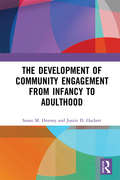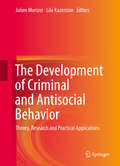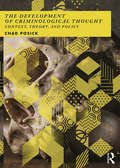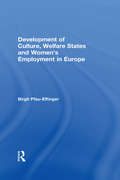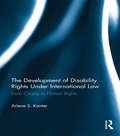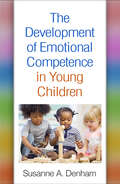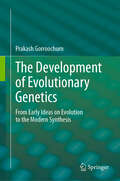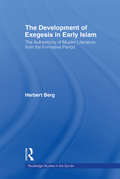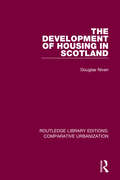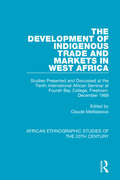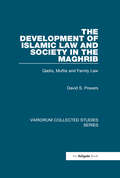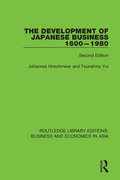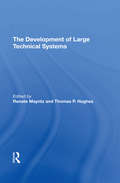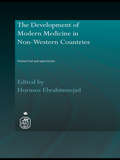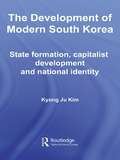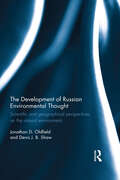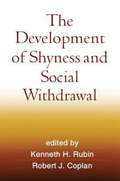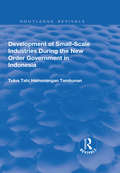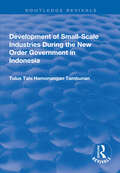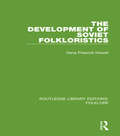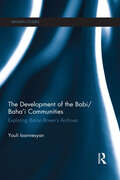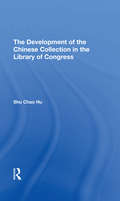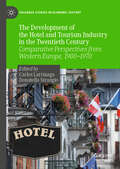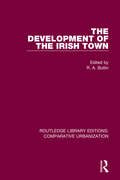- Table View
- List View
The Development of Community Engagement from Infancy to Adulthood
by Susan M. Henney Justin D. HackettThe Development of Community Engagement from Infancy to Adulthood uses a developmental perspective to trace how individuals develop the cognitive, behavioral, emotional, and moral capacity to be actively engaged in their communities. It also provides an analysis of the role of volunteerism and civic engagement in an era of social division, shrinking budgets, and shrinking services. In order to support childhood and adolescent volunteerism, we must understand how children become adults who volunteer a lot, sometimes, or not at all. This book describes the development of volunteerism from theoretical, empirical, and practical viewpoints, starting from the earliest development of empathy, through the social institutions that help shape us, to adolescence and young adulthood. It concludes with an analysis of modern ways to engage young citizens in social action. In doing so it addresses the key question – how can we encourage and support the development of the behaviors, belief systems, and ecologies that will lead to volunteerism and community involvement in our citizens? With fresh and thought-provoking arguments and insights, this book will be of interest to all academics and students working within the fields of social work, social services, volunteer management, applied social psychology, community psychology, service learning, and sociology, as well as non-profit personnel and activists.
The Development of Criminal and Antisocial Behavior
by Julien Morizot Lila KazemianThis edited book summarizes the current state of knowledge on the development of criminal and antisocial behavior over the life course. It focuses mainly on the developmental perspective, which has had a paradigmatic influence on current theoretical and empirical works in criminology. With a multidisciplinary perspective, the book reviews: (a) the fundamental concepts of developmental criminology; (b) the risk factors and developmental processes related to the most salient personal (e. g. , genetics, personality) and environmental (e. g. , family, peers, school) domains explaining the development of criminal and antisocial behavior; (c) the developmental issues related to a number a special themes (e. g. , women criminality, street gangs) and (d) the applied and policy implications of research in developmental criminology. In each chapter, prominent researchers from different disciplines such as criminology and psychology summarize the state of knowledge on a specific topic, identify the shortcomings of past research, offer recommendations for future research needs.
The Development of Criminological Thought: Context, Theory and Policy
by Chad PosickThis book focuses on the history and development of criminological thought from the pre-Enlightenment period to the present and offers a detailed and chronological overview of competing theoretical perspectives in criminology in their social and political context. This book covers: A discussion of how major theorists came to espouse their ideas and how the social context of the time influenced the development criminological thought; An exploration of the scientific method and the way in which theories are tested; Details of the origins of each theory as well as their recent developments in scholarship and research; Comparative and international research in theory; The empirical support for theory and the relationship between research and policy; Biosocial and developmental criminology, including the biosocial underpinnings of criminal behavior and the influence of neuroscience and brain psychology; Theoretical applications for explaining different crime types, such as genocide, white-collar crime, and environmental crime; A summary of the current state of criminological knowledge and a vision for the future of criminology. The book includes lists of further reading and chapter summaries, and is supported by timelines of key works and events. This book is essential reading for courses on criminological theory, criminal behaviour, criminal psychology and biosocial criminology.
Development of Culture, Welfare States and Women's Employment in Europe
by Birgit Pfau-EffingerThis refreshing volume introduces a theory for explaining cross-national differences in the social practice of women (and men) in the areas of family and employment. This provides a theoretical framework for the ensuing comprehensive cross-national analysis of the degree and forms of labour market integration of women in three European countries - Finland, West Germany and the Netherlands - from the 1950s until 2000. Cross-national differences are explained with a focus on cultural change and the development of welfare state, labour markets, the family and social movements. It is evident that change took place along different development paths that were based on deep-rooted historical differences in the cultural ideals of the family. Such historical differences and their explanations also form part of the analysis. The results of this survey contribute to the further development of cross-national sociology on social change, social and gender inequality, welfare state, labour markets and family structures.
The Development of Disability Rights Under International Law: From Charity to Human Rights
by Arlene S. KanterThe adoption of the Convention on the Rights of People with Disabilities (CPRD) by the United Nations in 2006 is the first comprehensive and binding treaty on the rights of people with disabilities. It establishes the right of people with disabilities to equality, dignity, autonomy, full participation, as well as the right to live in the community, and the right to supported decision-making and inclusive education. Prior to the CRPD, international law had provided only limited protections to people with disabilities. This book analyses the development of disability rights as an international human rights movement. Focusing on the United States and countries in Asia, Africa, the Middle East the book examines the status of people with disabilities under international law prior to the adoption of the CPRD, and follows the development of human rights protections through the convention’s drafting process. Arlene Kanter argues that by including both new applications and entirely new approaches to human rights treaty enforcement, the CRPD is significant not only to people with disabilities but also to the general development of international human rights, by offering new human rights protections for all people. Taking a comparative perspective, the book explores how the success of the CRPD in achieving protections depends on the extent to which individual countries enforce domestic laws and policies, and the changing public attitudes towards people with disabilities. This book will be of excellent use and interest to researchers and students of human rights law, discrimination, and disability studies.
The Development of Emotional Competence in Young Children
by Susanne A. DenhamThis engaging, authoritative text synthesizes a vast body of research on how young children develop the ability to understand, express, and manage their emotions, as well as the impact of these capacities on relationships, school readiness, and overall well-being. Illustrated with vivid vignettes, the book explains specific ways that parents, teachers, and education systems can foster or hinder emotional competence, and reviews relevant assessments and interventions. Compelling topics include emotion regulation as both product and process, cultural variations in emotion socialization, the expression of empathy and self-conscious emotions, risk factors for delays in emotional development, and connections between emotional competence and social–emotional learning (SEL). Almost entirely new, this book replaces Susanne A. Denham's influential earlier work, Emotional Development in Young Children.
The Development of Evolutionary Genetics: From Early Ideas on Evolution to the Modern Synthesis
by Prakash GorroochurnThe books describes the historical development of evolutionary genetics, starting from early ideas on evolution and ending with the modern synthesis. It provides an extensive coverage of the history of both evolution and heredity, and gives detailed descriptions of the works of Lamarck, Darwin, Mendel, Näageli, Weismann, de Vries, Galton, Pearson, Bateson, Johannsen, Morgan, Fisher, Wright and Haldane, amongst many others. The book does not deal only with a description of historical work: it also analyses and critiques existing theories and evolutionary beliefs throughout history, and discusses several controversies between biologists.
The Development of Exegesis in Early Islam: The Authenticity of Muslim Literature from the Formative Period (Routledge Studies in the Qur'an)
by Herbert BergThe most important debate in Islamic origins is that of the reliability of the lists of transmitters (isnads) that are said to guarantee the authenticity of the materials to which they are attached. Many scholars have come to the conclusion that most traditions (hadiths), which claim to preserve the words and deeds of Muhammad and early Muslim scholars, are spurious. Other scholars defend hadiths and their isnads, arguing for an early continuous written transmission of these materials. The first purpose of this study is to summarize and critique the major positions on the issue of the authenticity of hadiths in general and exegetical hadiths in particular. The second purpose is to devise a means of evaluating isnads that does not rely on circular arguments and to use it to determine if the hadiths in the Tafsir of al-Tabari, attributed to Ibn 'Abbas, are genuine.
The Development of Housing in Scotland
by Douglas NivenOriginally published in 1979, this volume begins with an historical summary of housing development in Scotland. Scottish urban housing has always followed a unique and distinctive pattern from the rest of the UK, resembling more closely the flatted developments of Continental Europe. The book compares the policies and programmes of development in EU countries and Scandinavia. The problems caused by over-emphasis on public-sector housing in Scotland since the First World War are discussed. A break-down of the work carried out by housing societies and associations reveals little national or local support in Scotland, unlike in European or Scandinavian countries where such association have formed a vital element in their housing policies.
The Development of Indigenous Trade and Markets in West Africa: Studies Presented and Discussed at the Tenth International African Seminar at Fourah Bay College, Freetown, December 1969
by Claude MeillassouxOriginally published in 1971 and written in English and French, with summaries in both languages, the essays in this volume dsicuss the effects of internal economic and political conditions and of external relations on the development of trade and markets in West Africa from the period of the slave trade to the growth in the 20th century in production for overseas markets and rapidly expanding urban centres. Other essays discuss various aspects of local and regional trade and markets from the nineteenth century onwards.
The Development of Islamic Law and Society in the Maghrib: Qadis, Muftis and Family Law
by David S. PowersThe first eleven essays in this collection treat the application of Islamic law in qadi courts in the Maghrib in the period between 1100 and 1500 CE. Based on preserved legal documents and the expert opinions of Muslim jurists (Muftis), the essays examine family law cases involving legal minority, guardianship, divorce, inheritance, bequests, and endowments. Cumulatively, the cases bear witness to the effectiveness and efficiency of the Islamic judicial system in this period. Contrary to popular perceptions, the cases demonstrate that Muslim jurists placed a high value on reasoned thought and were sensitive to the manner in which law, society, and culture interacted with, and shaped, each other. The final essay shows how the treatment of family endowments by colonial regimes in Algeria and India at the end of the 19th and beginning of the 20th centuries shaped, or misshaped the modern western scholarly understanding of Islamic law.
The Development of Japanese Business, 1600-1980: Second Edition (Routledge Library Editions: Business and Economics in Asia #8)
by Johannes Hirschmeier Tsunehiko YuiThe study, first published in 1981, traces the history and development of Japanese business from the seventeenth century, and is the only text that systematically treats the rise of Japanese business in its full complexity and against the background of contemporary social and political conditions. Each section discusses the socio-economic conditions, the leadership and business elites, the internal and external structures and the impact of values. The emergence of new types of businessmen, their ideas and approaches, their relations to the government, their handling of labour problems are all analysed. One of the most intriguing aspects of this study is the unique importance of Japanese values, their tenacious persistence and uncanny flexibility and resilience. The strengths and weaknesses of these values are examined in detail.
The Development Of Large Technical Systems
by Thomas Hughes Renate MayntzThis book is an outcome of the conference on the development of large technical systems held in Berlin in 1986. It focuses on the comparative analysis of the development of large technical systems, particularly electrical power, railroad, air traffic, telephone, and other forms of telecommunication.
The Development of Modern Medicine in Non-Western Countries: Historical Perspectives (Royal Asiatic Society Books)
by Hormoz EbrahimnejadThe history of medicine in non-European countries has often been characterized by the study of their native "traditional" medicine, such as (Galenico-)Islamic medicine, and Ayurvedic or Chinese medicine. Modern medicine in these countries, on the other hand, has usually been viewed as a Western corpus of knowledge and institution, juxtaposing or replacing the native medicine but without any organic relation with the local context. By discarding categories like Islamic, Indian, or Chinese medicine as the myths invented by modern (Western) historiography in the aftermath of the colonial and post colonial periods, the book proposes to bridge the gap between Western and 'non-Western' medicines, opening a new perspective in medical historiography in which 'modern medicine' becomes an integral part of the history of medicine in non-European countries. Through essays and case studies of medical modernization, this volume particularly calls into question the categorization of ‘Western’ and ‘non-Western’ medicine and challenges the idea that modern medicine could only be developed in its Western birthplace and then imported to and practised as such to the rest of the world. Against the concept of a ‘project’ of modernization at the heart of the history of modern medicine in non-Western countries, the chapters of this book describe ‘processes’ of medical development by highlighting the active involvement of local elements. The book’s emphasis is thus on the ‘modernization’ or ‘construction’ of modern medicine rather that on the diffusion of ‘modern medicine’ as an ontological entity beyond the West.
The Development of Modern South Korea: State Formation, Capitalist Development and National Identity (Routledge Advances in Korean Studies)
by Kyong Ju KimThe Development of Modern South Korea provides a comprehensive analysis of South Korean modernization by examining the dimensions of state formation, capitalist development and nationalism. Taking a comparative and interdisciplinary approach this book highlights the most characteristic features of South Korean modernity in relation to its historical conditions, institution traditions and cultural values paying particular attention to Korean's pre-modern civilization.
The Development of Russian Environmental Thought: Scientific and Geographical Perspectives on the Natural Environment (Routledge Contemporary Russia and Eastern Europe Series)
by Jonathan Oldfield Denis J ShawThis book provides a comprehensive overview of the very rich thinking about environmental issues which has grown up in Russia since the nineteenth century, a body of knowledge and thought which is not well known to Western scholars and environmentalists. It shows how in the late nineteenth century there emerged in Russia distinct and strongly articulated representations of the earth’s physical systems within many branches of the natural sciences, representations which typically emphasised the completely integrated nature of natural systems. It stresses the importance in these developments of V V Dokuchaev who significantly advanced the field of soil science. It goes on to discuss how this distinctly Russian approach to the environment developed further through the work of geographers and other environmental scientists down to the late Soviet period.
Development of Shyness and Social Withdrawal
by Kenneth Rubin Robert CoplanWhile both positive and negative peer interactions have long been a focus of scientific interest, much less attention has been given to children who tend to refrain from interacting with peers. This volume brings together leading authorities to review progress in understanding the development, causes, and consequences of shyness and social withdrawal. Compelling topics include The interplay of biological, psychological, family, and interpersonal processes in shyness and social withdrawal from infancy through adolescence. The impact on peer relationships and academic performance. Links among shyness, social withdrawal, and social anxiety disorder. The positive side of unsociability when to 'leave children alone. 'Implications for clinical practice and educational interventions.
Development of Small-scale Industries During the New Order Government in Indonesia (Routledge Revivals)
by Tulus Tahi TambunanThis title was first published in 2000: As in many other LDCs, in Indonesia small-scale industries (SSIs) are important, particularly with respect to the creation of employment opportunities. SSIs are expected to absorb many millions of workers who have been displaced by current economic crisis. This work seeks to explain the pattern of development of SSIs in Indonesia within a broader theoretical framework. It also deals with a number of SSI development-related aspects that in Indonesia so far have never or rarely been studied, such as the formation of strategic alliance, cluster development, and application of theories of flexible specialization to the LDCs. The book also tries to examine empirically the effects of the current economic crisis and to assess theoretically the likely impact of the full implementation of the agreed IMF reform package on SSI development in the country. Main problems faced by small producers and the government policy environment are highlighted through several detailed examples.
Development of Small-scale Industries During the New Order Government in Indonesia (Routledge Revivals)
by Tulus Tahi TambunanThis title was first published in 2000: As in many other LDCs, in Indonesia small-scale industries (SSIs) are important, particularly with respect to the creation of employment opportunities. SSIs are expected to absorb many millions of workers who have been displaced by current economic crisis. This work seeks to explain the pattern of development of SSIs in Indonesia within a broader theoretical framework. It also deals with a number of SSI development-related aspects that in Indonesia so far have never or rarely been studied, such as the formation of strategic alliance, cluster development, and application of theories of flexible specialization to the LDCs. The book also tries to examine empirically the effects of the current economic crisis and to assess theoretically the likely impact of the full implementation of the agreed IMF reform package on SSI development in the country. Main problems faced by small producers and the government policy environment are highlighted through several detailed examples.
The Development of Soviet Folkloristics (Routledge Library Editions: Folklore)
by Dana Prescott HowellCrucial to the world history of folkloristics is this key study, first published in 1992, of the development of folklore study in the Soviet Union. Nowhere else has political ideology been so heavily involved with folklore scholarship. Professor Howell has examined in depth the institutional development of folkloristics in the Soviet Union in the first half of the twentieth century, concentrating especially upon the transition from pre-revolutionary Russian to Soviet Marxist folkloristics. The study of folklore moved from narrator studies to the description of the relationship of lore to larger contexts of social groups and social classes. Showing an exceptional knowledge of Russian, political theory and folkloristics, Dana Howell provides a valuable window into the rise of folkloristics in a country undergoing almost unprecedented changes in social and political conditions.
The Development of the Babi/Baha'i Communities: Exploring Baron Rosen's Archives (Iranian Studies)
by Youli IoannesyanBaron Rosen’s Babi/Baha’i archives presents private letters and diplomatic correspondence from the nineteenth century, preserved among the prominent Russian scholar Baron Victor Rosen’s materials in the Archive of the Russian Academy of Sciences, St. Petersburg branch. The materials cast light on the first studies of the Babi and Baha’i Faiths, new religious phenomena which, in Baron Rosen’s time, were emerging in Persia. Iran has always been a strategic concern of Russia’s geopolitical interests and the traditional importance which has been given to Persia has manifested itself in hundreds of documents and writings collected by the pre-revolutionary Russian diplomats and scholars. These documents, large parts of which have never been published before, reveal new information on the attitude of the Russian government towards religious and ethnic minorities as well as towards related issues within the Russian Empire and abroad. Bringing together materials in Russian, English, Persian, Arabic and French related to the Babi and Baha’i Faiths from Rosen’s archive in the original languages with an English translation, this book will be of great interest to students and researchers in the fields of Iranian Studies, Religion and Middle East Studies amongst others.
The Development Of The Chinese Collection In The Library Of Congress
by Shu Chao HuThis is the first comprehensive and in-depth study of the Chinese collection in the Library of Congress, the largest collection of its kind in the Western world. Started in 1869 with some 950 books received in the first exhange of publications between the United States and China, the collection has grown so steadily that in 1977 it numbered more than 430,000 volumes, including 2,000 rare Chinese items, some of which were printed in A.D. 975. In this primarily historical study, Professor Hu examines the social, cultural, and political forces that led to the development and growth of the collection, the acquisitions policies followed, and the sources of personal and financial support found within and outside the Library of Congress. He also explores the methods by which the library has built up several strong areas in the collection, particularly those of Chinese gazetteers, or local histories; ts’ung-shu, or collections of reprints; and rare works.
The Development of the Cultural Industry in China: Theories, Policies, and Strategies (China Connections)
by Huilin HuThis volume addresses the rapid growth of China’s cultural industry and its significant cultural and economic impact on the country. It considers what exactly constitutes the cultural industry, defining the basis for discussions on issues as the internal tensions constraining China’s cultural industry development. It examines the place of culture and cultural industry in relation to China’s overall development, and what kinds of strategies, policies and concrete measures are most effective in promoting the industry’s growth, exploring the role of Government in Cultural Industrial Development.
The Development of the Hotel and Tourism Industry in the Twentieth Century: Comparative Perspectives from Western Europe, 1900–1970 (Palgrave Studies in Economic History)
by Carlos Larrinaga Donatella StrangioThis edited collection explores the pivotal role of the hotel industry in building Western Europe’s tourism economy during the 20th century. The book brings together ten contributions focused on the same period, 1900-1970, to offer comparative perspectives from across the region including Italy, Switzerland, France, Spain and Britain. Drawing on historical case studies, chapters illuminate the different factors linking hotels and the broader tourism system including interventions of the public authorities and the State, the importance of private involvement, commercial strategies, the medium-term development of private hotels, hotel entrepreneurship, and the impact of economic crises and wars. By placing differing national approaches taken to the growth of the hotel industry in comparison, the book aims to fill a gap in the historiography of European hospitality and shed light on the wider impact of hotels and tourism on economic development at both a national and regional level. It will be of interest to a range of scholars, including in economic and business history, tourism studies, the history of tourism management, and social history.
The Development of the Irish Town
by R. A. ButlinOriginally published in 1977, and now with an updated new Preface, this volume covers the question of Irish urban origins in the pre-Norman period, the character and development of the medieval towns, the changing forms and functions of towns and cities in the early modern period. It also examines the substantial changes in size and form effected by population growth and town planning in the eighteenth and nineteenth centuries. Ireland’s urban history is unique and particularly interesting for the way it contrasts with developments in the urban history of western Europe. Unlike most west European regions, it was not colonised by the Romans.
